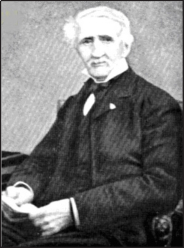- COTTON
- UNITED KINGDOM (see also List of Individuals)\
 15.5.1803 Addiscombe/UK - 25.7.1899 Dorking/UK\Sir General Arthur T. Cotton was a distinguished representative of the Madras Engineers. He arrived there in 1821. All his soldering was done in 1824 as a subaltern in the first Burmese War. Later he was posted to the Public Works Department and in 1828 he was appointed to the separate charge of the great irrigation works on the River Cauvery. This scheme was endangered by river waters to flow down the Coleroon, deserting the branch and its dependent irrigation channels. Cotton prepared in 1835 a scheme consisting of two dams. In 1845, a project was presented to the Government of Madras for an immense dam across the Godaveri River, whose width is there 5 km. After five years, works were completed and proved successful. The district, formerly a state of extreme poverty, was then the most prosperous in India.\Cotton was promoted lieutenant-colonel in 1850 and colonel in 1854. From 1858, he was the chief engineer of India and the adviser of the government on all matters of public works. It was during this time that Cotton heavily criticized the canal works of Proby Cautley (1802-1871) who had designed and executed the Ganges Canal. The dispute was about the point of river fixation, which Cautley had laid at the foot of the Himalaya close to Roorkee, whereas Cotton proposed it further downstream. The almost 1,000 km long canal was an impressive construction of the era, and designed prior to the knowledge on uniform flow and sediment transport formulae. Cotton was probably the first engineer who had an immense impact on the development of irrigation in India during the British rule. He was the first to conceive the large reservoirs and inter-basin transfers through a system of canals as a solution to India's water problems. In 1860, the Queen conferred on him a Knighthood. Later, when back in England, he devoted attention to the form of river steamers and canal boats in terms of resistance. He was promoted to general in 1876. A biography was prepared by his daughter in 1900.\Anonymous (1920). Cotton, Sir Arthur Thomas. Who was who 1897-1916: 160. Black: London. Cotton, A.T. (1866). Results of irrigation works in Godaveri District. HMO: London.Cotton, A.T. (1869). Project for cheap navigation canals. Trans. Indian Engineers 7: 267-273. Cotton, A.T. (1885). Public works in India. Higginbotham: Madras.Hope, L. (1900). General Sir Arthur Cotton. Hodder&Stoughton: London. PKothyari, U.C. (2004). Arthur Cotton K.C.S.I. Personal communication. University: Roorkee. P Ward, B.R. (1909). Sir Arthur Cotton. The school of military engineering 1812-1909: 96-98. Watson, C.M. (1915). General A.T. Cotton. History of Corps of Royal Engineers 3: 243-246.
15.5.1803 Addiscombe/UK - 25.7.1899 Dorking/UK\Sir General Arthur T. Cotton was a distinguished representative of the Madras Engineers. He arrived there in 1821. All his soldering was done in 1824 as a subaltern in the first Burmese War. Later he was posted to the Public Works Department and in 1828 he was appointed to the separate charge of the great irrigation works on the River Cauvery. This scheme was endangered by river waters to flow down the Coleroon, deserting the branch and its dependent irrigation channels. Cotton prepared in 1835 a scheme consisting of two dams. In 1845, a project was presented to the Government of Madras for an immense dam across the Godaveri River, whose width is there 5 km. After five years, works were completed and proved successful. The district, formerly a state of extreme poverty, was then the most prosperous in India.\Cotton was promoted lieutenant-colonel in 1850 and colonel in 1854. From 1858, he was the chief engineer of India and the adviser of the government on all matters of public works. It was during this time that Cotton heavily criticized the canal works of Proby Cautley (1802-1871) who had designed and executed the Ganges Canal. The dispute was about the point of river fixation, which Cautley had laid at the foot of the Himalaya close to Roorkee, whereas Cotton proposed it further downstream. The almost 1,000 km long canal was an impressive construction of the era, and designed prior to the knowledge on uniform flow and sediment transport formulae. Cotton was probably the first engineer who had an immense impact on the development of irrigation in India during the British rule. He was the first to conceive the large reservoirs and inter-basin transfers through a system of canals as a solution to India's water problems. In 1860, the Queen conferred on him a Knighthood. Later, when back in England, he devoted attention to the form of river steamers and canal boats in terms of resistance. He was promoted to general in 1876. A biography was prepared by his daughter in 1900.\Anonymous (1920). Cotton, Sir Arthur Thomas. Who was who 1897-1916: 160. Black: London. Cotton, A.T. (1866). Results of irrigation works in Godaveri District. HMO: London.Cotton, A.T. (1869). Project for cheap navigation canals. Trans. Indian Engineers 7: 267-273. Cotton, A.T. (1885). Public works in India. Higginbotham: Madras.Hope, L. (1900). General Sir Arthur Cotton. Hodder&Stoughton: London. PKothyari, U.C. (2004). Arthur Cotton K.C.S.I. Personal communication. University: Roorkee. P Ward, B.R. (1909). Sir Arthur Cotton. The school of military engineering 1812-1909: 96-98. Watson, C.M. (1915). General A.T. Cotton. History of Corps of Royal Engineers 3: 243-246.
Hydraulicians in Europe 1800-2000 . 2013.
